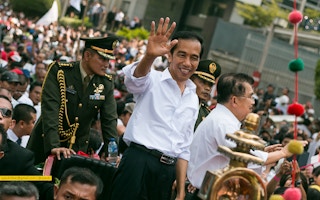In commemoration of the 79th anniversary of the Republic of Indonesia, President Joko Widodo (Jokowi) gave a speech, part of which touched on the country’s energy transition.
In his speech, President Jokowi said that so far, his government has been consistent in carrying out Indonesia’s energy transition carefully and gradually. Furthermore, he maintained that the energy transition desired by the government is a just one, which produces energy that is easily accessible and affordable for the public. Are President Jokowi’s claims true?
The short answer is no. Since the beginning, President Jokowi has not been serious about implementing the energy transition. At various international events, President Jokowi often boasts about the Just Energy Transition Partnership (JETP) funding scheme, which aims to channel funds from developed countries to support energy transition activities in developing ones. However, he has also said that JETP should not disrupt the coal business as a whole, thus locking in the fossil fuel.
Almost simultaneously with the launch of JETP, President Jokowi issued Presidential Regulation (Perpres) Number 112 in 2022, concerning the Acceleration of Renewable Energy Development for Electricity Supply. When examined carefully, Perpres 112 appears to be a legal umbrella for the continuation of the coal business through captive power or integrated power plants in industrial areas.
Jokowi’s technique of locking in coal was then seen in the Comprehensive Investment and Policy Plan (CIPP) for Indonesia’s JETP launched in November 2023. In the CIPP, integrated power plants in industrial areas were not taken into account at all. Is this locking in of coal consistent with the implementation of a just energy transition?
Furthermore, President Jokowi defines a just energy transition as one in which renewable energy is accessible and affordable for communities. Logically, for energy to be accessible and affordable, it must be produced close to the community. Energy centralisation must be make way for energy democratisation. However, reality on the ground is different. The CIPP ignores the development of community-based renewable energy and directs its investment towards large-scale renewable energy development. Large-scale renewable energy development strengthens energy centralisation and often causes agrarian and environmental conflicts with surrounding communities.
On the other hand, regarding community-based renewable energy, the research results of Indonesia’s Center of Economic and Law Studies (Celios) and 350.org Indonesia, titled Opportunities and Challenges for Community-Based Renewable Energy, show that if 50 percent of the US$20 billion JETP funds are allocated to develop community-scale renewable energy, it can produce a capacity of 2.18 gigawatts (GW). This means that community-based renewable energy generators are at least capable of replacing 3.3 steam power plant units equivalent to Cirebon-1, which has a capacity of 660 megawatts (MW). Not only that, community-based renewable energy is also capable of contributing IDR 10,529 trillion to gross domestic product (GDP) over 25 years.
Although community-based renewable energy development will produce more accessible and affordable energy for Indonesians, is not considered profitable by rich countries and international aid institutions because JETP’s funding structure is dominated by foreign debt.
President Jokowi’s weak commitment to the energy transition is increasingly apparent when the government awarded coal mining concessions to two mass Islamic organisations, Nahdlatul Ulama (NU) and Muhammadiyah. President Jokowi must know that the problem with coal is not only confined to the areas where it is mined, but also the burning of coal, which causes an increase in greenhouse gas emissions, worsening the climate crisis. This clearly weakens President Jokowi’s commitment to the energy transition.
The involvement of NU and Muhammadiyah in the dirty business of coal energy is not only a washing machine for the ecological sins of the coal industry but will also weaken the environmental movement by Indonesia’s civil society.
In the future, the environmental movement will clash with NU and Muhammadiyah. As stakeholders in the coal energy business, NU and Muhammadiyah will almost certainly reject any idea of a clean energy transition as this would disrupt their business interests. It is possible that to stop the environmental movement spreading narratives about the energy transition, both mass organisations will use religious narratives. This use of religious narratives to defend the coal energy could lead to physical and verbal violence against environmental activists. Is this what President Jokowi meant by implementing the energy transition carefully?
Our worry now is that this practice of only paying lip service to the energy transition will continue in the era of the next Indonesian President, Prabowo Subaianto. In international forums, Prabowo has regularly emphasised that his government is a continuation of President Jokowi’s. This means that will be no change in Prabowo’s government when it comes to energy policies.
One of the reasons the public doubts Prabowo’s commitment to the energy transition is due to the incoming president’s track record and his association with coal energy businessmen. During the 2024 presidential election, coal company boss Garibaldi ‘Boy’ Thohir confidently declared his support for Prabowo. In fact, according to the Mining Advocacy Network (JATAM), Prabowo Subianto was once a shareholder in a coal company with a concession area of 4,793 hectares in Berau, East Kalimantan. What kind of just energy transition can be expected from Prabowo Subianto given his ties to the dirty coal industry?
Faced with these realities, we expect that Jokowi’s energy transition platitudes will be continued by Prabowo over the next five years. Dark clouds for environmental protection loom over Indonesia’s horizon. The only way to dispel them is to invite the public to continue speaking out on what an equitable energy transition should look like. However, it is possible that in the future, speaking out will become a luxury, just like it was when President Soeharto, who is also Prabowo Subianto’s former father-in-law, was in power in Indonesia.
Firdaus Cahyadi is the interim Indonesia Team Lead for climate campaign group 350.org.









